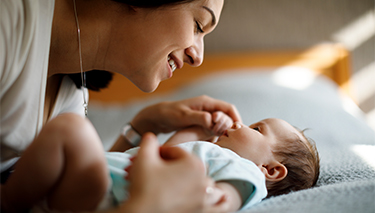Crying and Comforting
Why do babies cry? It's not always clear exactly why, but you can be sure when your baby cries, they're trying to communicate with you that something isn t right. Crying is the major way which young babies communicate with others.
Babies don t cry to annoy the people close to them, or because they are being naughty or grumpy, babies just cry, it's what they do. Some babies seem to be more sensitive to change and discomfort than others, though ignoring their cries won t make them change their behaviour. Usually, a feed and a cuddle, then a sleep will help to soothe and comfort them.
Fortunately, crying hardly ever indicates a major physical problem or illness. If you are worried about your baby, have them reviewed by a doctor to rule out a physical cause for their distress.
At most times, a crying baby is healthy, even for babies who cry for what can seem to be a long time. Your doctor will be able to examine your little one and take a careful history from you. Having your baby physically checked will give you more understanding about the cause for your baby's crying.
What is your baby trying to tell you?
Here are the types of issues your crying baby may be trying to tell you, and ways you can help support them:
- Are they hungry or thirsty? This is the most common reason for crying. Let your baby decide when to come off the first breast, if you're breast-feeding. Then offer the second breast.
- Perhaps your baby needs extra formula if they're bottle feeding. Check with your child health nurse to find out your baby's quota of milk.
- Are they getting a good, satisfying feed? Check your baby's position on the breast, to make sure they're stimulating the letdown reflex, which brings the calorie-rich hindmilk. If you're bottle-feeding, check the teat hole is not too small causing sucking and swallowing to be difficult, or that the hole is too big and overwhelming them.
- Does your baby need winding ? Sit your baby in an upright position and rub their back.
- Is your baby dressed comfortably for the weather? Feel their chest with the back of your hand; it should feel comfortably warm, not hot and clammy, or cold.
- In the early weeks it is common for babies to experience colic.
- Does your baby need some stimulation and company? Cuddles, soft singing, back patting, a bath, can all be calming and soothing.
- Is your baby tired, but unable to settle down to sleep? Try rocking or pushing them in their pram.
- If your little one irritated by noise, excitement and people? If so, try going into a quiet room with them.
- Is your baby uncomfortable? Check their clothing for tightness round the wrists or ankles. A baby with nappy rash will cry more if they're in a wet or dirty nappy.
- Consider if your baby simply wants a cuddle from you. They will enjoy the feeling of security they experience when in your arms, your smell and just being near you.
Remember
Always have your baby checked by a doctor if you are worried or they don t soothe. Although it's normal for babies to cry, it's important to rule out any physical cause for crying. You can also check with your Child Health Nurse to learn settling strategies for your baby.
For more information see Baby health care or Baby Care.
Reviewed and edited by Jane Barry, midwife and child health nurse on 3 June 2021.


Last Published* May, 2024
*Please note that the published date may not be the same as the date that the content was created and that information above may have changed since.
















